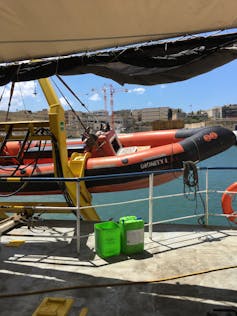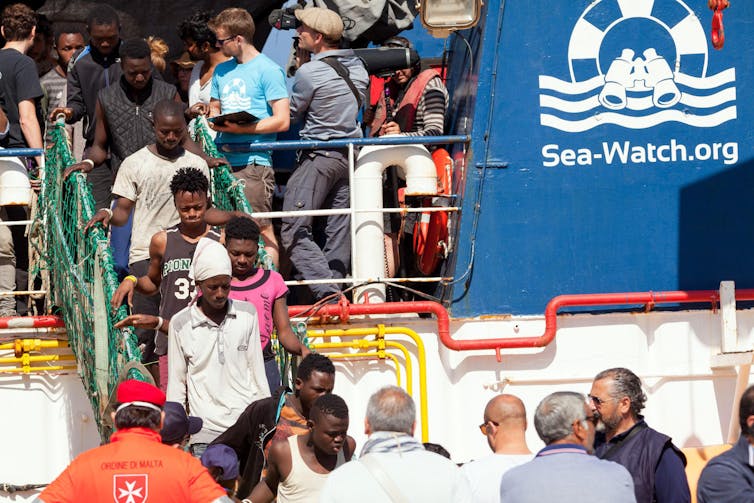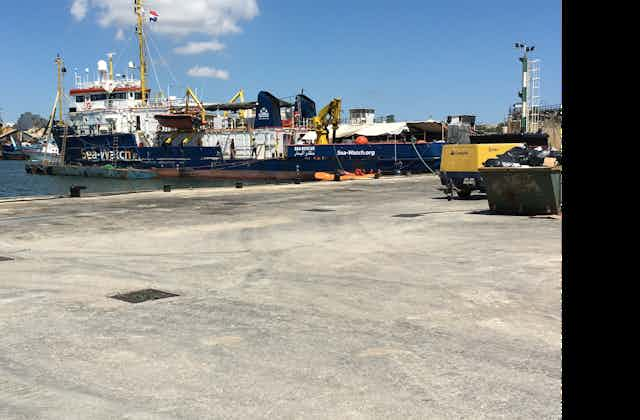Malta’s detention of the Sea-Watch 3 vessel on July 2 represents an increasingly aggressive crackdown on NGO search and rescue vessels in the central Mediterranean. While many groups halted their activities over the past year, Sea-Watch continued in its efforts to search for and rescue people on the move across the Mediterranean Sea.
A few days before the ship was detained, I visited the Sea-Watch 3 vessel in Malta as part of my research on Mediterranean border deaths. A newly arrived crew of volunteers were wondering whether or not they would manage to make the journey out to sea. Some of the longer-standing crew members had been busy supporting its sister ship, the Lifeline, which had been stuck at sea for five days with 234 vulnerable people on board, including 70 unaccompanied minors, three babies and a child.
As with the Aquarius vessel, which became stuck at sea with 630 people on board earlier in June, the Lifeline found that after it had rescued people at sea there was no port open where it could dock. Initially accused of aiding and abetting irregular migration, the captain of the Lifeline was charged in Malta on July 2 for the ship’s lack of proper registration and the ship was impounded on the island.

It is in this context that the Sea-Watch 3 vessel was also detained in Malta, despite being listed as a Dutch vessel entitled to fly the Dutch flag. Although Sea-Watch is a German-based civil society group that also includes volunteers from other countries, the Sea-Watch 3 flies the Dutch flag. It previously sailed as Dignity I under the Dutch branch of Médecins Sans Frontières, before the 50 metre long ship was bought by Sea-Watch in 2017. Sea-Watch 2 was subsequently bought and renamed as Lifeline.
It is not just the criminalisation of crew members that has become a significant factor in impeding NGO missions in the Mediterranean. So too have threats of violence from the Libyan coastguard against such groups. Three NGOs: MSF, Save the Children and Sea Eye stopped their activities in mid-2017 in the face of the hostile stance of the Libyan authorities.
Co-operation stalling
The EU has invested resources into training the Libyan coastguard over the past few years, which has only added to what appears to be an increasingly hostile European response to NGOs carrying out search and rescue in the Mediterranean. The International Maritime Organisation (IMO) is also providing maritime security training for the Libyan coastguard, in an effort to make it a functioning entity.
When I met members of the Sea-Watch crew in late June, they told me that the IMO had just started to recognise Libya’s capability to coordinate sea rescue. This means that the Italian Maritime Rescue Coordination Centre (MRCC Rome) is now refusing to co-ordinate rescues off the Libyan coast.
Read more: Slave auctions in Libya are the latest evidence of a reality for migrants the EU prefers to ignore
As one crew member I spoke to said, this has led to the MRCC Rome “actively rejecting any responsibility” for coordinating civilian rescues, so that by late June the co-operation between Sea-Watch and MRCC Rome had “stopped altogether”.
I was told by Sea-Watch crew members that the halt in co-operation of recent weeks reflects a broader shift that has been occurring over the past year or so. While Sea-Watch previously saw itself as an ally of MRCC Rome with a shared concern to rescue people at sea, it is now increasingly treated as an intruder that lures people across the Mediterranean Sea to the EU.
The crew on the Sea-Watch cautioned about the unreliability of the Libyan coastguard and their failure to meet the requirements of search and rescue. I was told:
The Libyan coastguard has grown out of a militia group … in a civil war … we have documented I don’t know how many cases of their mistreatment of the refugees, of violence and abuse which have led to the deaths of people at sea, and for these reasons we absolutely reject to work with them because they are not aiding people.
Sea-Watch has played a critical role in documenting the aggressive actions of the Libyan coastguard, repeatedly echoing wider concerns about the dangers facing people who are intercepted and returned to Libya.
Lives at stake
Such cautions fall on deaf ears. The conclusions of the June European Council summit restated the EU’s support for Libyan search and rescue, and emphasised that any operations must “not obstruct operations of the Libyan coastguard”.

European leaders have increasingly claimed that search and rescue acts as a “pull factor” for migration, despite research which emphasises that such claims represent little more than a toxic narrative. While the EU’s approach is often dressed up in humanitarian terms, migration experts have argued that recent developments reflect the end of the humanitarian turn toward search and rescue in the Mediterranean. Despite the best efforts of groups such as Sea-Watch, it appears that there is stronger impetus than ever from within the EU to ensure that this is the case.
Read more: NGOs under attack for saving too many lives in the Mediterranean
Regardless of the relationship between deaths at sea and organised search and rescue operations in the longer term, in the immediate term the effect of EU actions is that more people die at sea. According to UN Operations in Libya, 204 people died off the coast of Libya during the last week of June. From this perspective, the lives of people at sea appear as nothing more than collateral damage in Europe’s offensive against search and rescue NGOs.

